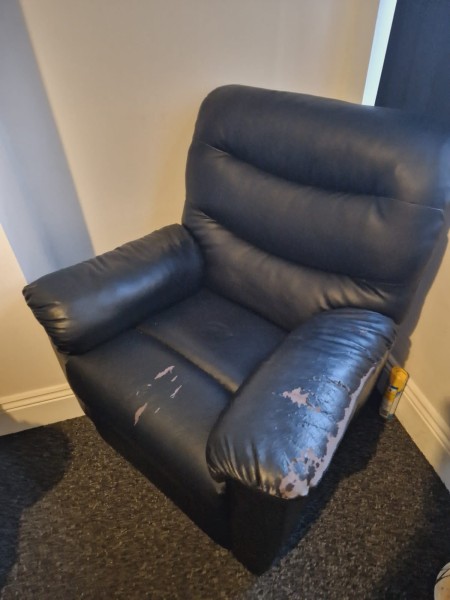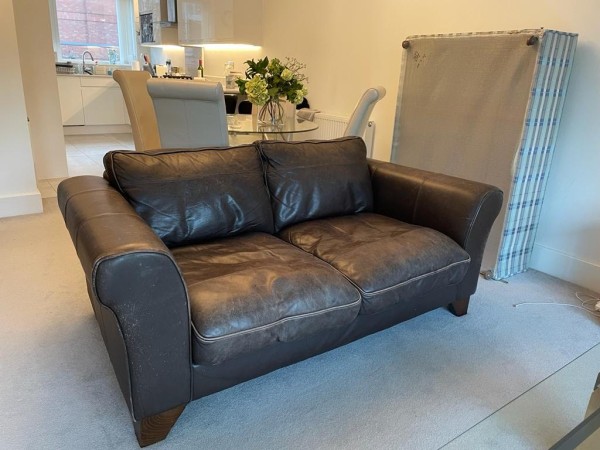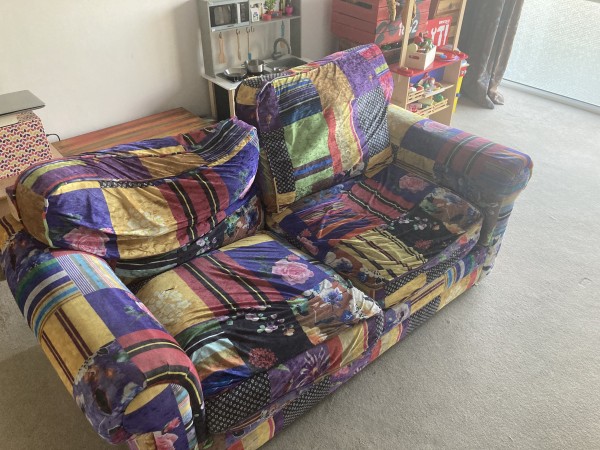Sofa Removal & Disposal Service: Guide to Getting Rid of Sofas & Armchairs
 Edited by Ali Lijee
Edited by Ali Lijee
Getting rid of a sofa, armchairs or an entire three-piece suite? Don’t worry, our man and van teams offer sofa disposal services that will make light work of any furniture you need to dispose of. We operate throughout the UK, collecting household rubbish that would otherwise be destined for the local tip or a skip. The great thing about using our service is that we take on the job for you. That means no mess in the back of your car, no worrying about how to deal with bulky furniture and no skip taking up valuable space on your driveway.
We will load, remove and dispose of your sofa
Table of contents:
- Best sofa removal & disposal services UK
- Sofa & armchair removal services near you
- Sofa removal & disposal: questions people commonly ask
Best sofa removal & disposal services UK
Whether you’re upgrading to a newer sofa, moving out and no longer need your current sofa, or your old sofa has accumulated all sorts of foul stains and/or odours, rubbish removal companies near you are able to collect and dispose of your sofa quickly and at competitive prices.
Rubbish.com has local man and van rubbish removal teams near you that can help collect and dispose of sofas using eco-friendly rubbish removal methods such as donating, refurbishing, and recycling whenever possible.
Sofa & armchair removal services near you
While a comfortable and cosy sofa can be the centrepiece for well-deserved relaxation after a long day of work, there may come a time when you need to get rid of an old sofa.
The licensed waste haulers listed on Rubbish.com can collect all types of sofas including 2-seater sofas, 3-seater sofas, sofa beds, corner sofas, leather suites, settees, armchairs, sectionals, and more. Contact one of our man and van rubbish removal teams today.
Gallery of sofas & armchairs we have disposed of
Sofa removal & disposal: questions people commonly ask
How do I get rid of a sofa near me?
There are many ways to get rid of a sofa in the UK, depending on its condition. If it is in reasonable condition, you may be able to sell it, give it to family members or a friend or neighbour, or donate it to a charity.
For sofas in poor condition, you can hire a van and haul it to your local tip to dispose of it, although it is often easier and more convenient to hire a man and van rubbish removal company to dispose of it for you. Call your local council for guidance on sofa removal near you.
What is the average lifespan of a sofa?
On average, a sofa should last from around 7 to 15 years, depending on its quality of construction, materials, upholstery, maintenance, and usage. Britons replace their sofas every 11 years, on average.
Sofas made of hardwood frames with high-quality leather or fabric upholstery that are well-maintained and cared for can last 15 years or longer, whereas frequent usage and poor maintenance habits as well as poor quality craftsmanship may lower the lifespan to 7 years or lower.
Can you leave a sofa on the street in the UK?
While it is common in many council areas to leave furniture such as sofas on the street in the UK, doing so may be considered fly-tipping if rubbish is left out without prior collection arrangements or if it isn’t part of routine bin collections.
If you leave a sofa on the street in the UK, ensure that it does not block the pavement and that it has been scheduled for collection from a man and van team, for example. Leaving a sofa out for a scrap man or as a free donation could incur a penalty for fly-tipping.
What is the hardest thing to remove from a couch?
The hardest things to remove from a sofa tend to be tough stains and odours. These include stains from things such as red wine, coffee, tea, ink, grease, oil, and blood, as well as odours such as tobacco and pet urine.
Most stains can be easy to remove if attended to immediately; if ignored, they can set in and become nearly impossible to fully remove. Unwanted odours such as pet urine and tobacco can persist for a long time and may be fully or partially removed with deep cleaning of the upholstery.
Where can I sell my sofa in the UK?
You may be able to sell your sofa through online marketplaces such as Gumtree, Facebook Marketplace, or Etsy. Depending on the condition of your sofa, you may be able to earn a few quid or you may have to settle for giving it away for free so long as the buyer is willing to collect it and transport it themselves.
Some of the people looking for sofa removal near you for free might include uni students, first-time homebuyers, families on a tight budget, or anyone willing to reupholster or refurbish the sofa.
How do I get rid of my old sofa for free?
Some of the most common ways to get rid of an old sofa for free include donating it to charity, giving it away to friends, family, or a neighbour, or listing it for sale (free if they collect it) on online marketplaces. Some councils may offer furniture removal near you, so contact your local council to see if they offer this service.
Avoid leaving the sofa on the street for collection by the scrap man or any passersby. While common, you could incur a penalty for fly-tipping.
Who will pick up furniture for free in the UK?
Many charities in the UK will collect furniture such as sofas for free to provide it to families in need. Some charities that accept furniture donations include Oxfam, The Salvation Army, the British Heart Foundation, and Cancer Research UK. Be sure to visit their websites for more information on how to donate your sofa to these organisations.
Furthermore, many charities will not accept sofas or other furniture in poor condition whereby it cannot be refurbished, nor will they be able to accept upholstered sofas and other items that require a fire label.
How can I recycle my couch for free?
Many sofas can be recycled for free through certain retailers that offer used sofa or furniture recycling services. Most major retailers in the UK charge around £90-£100 for sofa collection services, however. Recycling facilities may also accept used sofas, although this is not typically free.
Licensed waste carriers in the UK may be able to help maximise recycling in order to minimise non-recyclable waste at the tip. Depending on the materials used in your sofa, this may include dismantling the sofa and salvaging metal springs and components, wood framing, recyclable fabrics, and/or foam upholstery.
How much does it cost to skip a sofa?
The cost of collecting and disposing of a sofa in the UK can vary from around £70 to £100 or more. Licensed waste haulers tend to charge less to remove a sofa than the major retailers, however, the cost has increased for sofa removal across the UK due to POP legislation enacted in 2023.
Local councils can also collect unwanted sofas, although the cost may vary from free to £70 or more, depending on your local council. Note that council furniture collection is not always available and those that do may take weeks to collect your unwanted sofa.
What does a sofa fire label look like?
Sofa fire labels in the UK come in two different formats. Regardless of format, the label should always contain a caution message, batch or identification number, whether or not the sofa uses a fire-resistant interliner.
Additional information that can be found on the sofa fire label include the name and postcode of the original supplier, date of manufacture, measures taken to ensure compliance with regulations, and a description of covering and filling materials.
How can you tell if a sofa has a fire label?
All sofas sold in the UK since 1988 must come with a fire safety label and be treated with fire-retardant chemicals, according to the Furniture and Furnishings (Fire) (Safety) Regulations. If a sofa was manufactured before 1988 then it will not have a fire label. Sofas made before the 1950s are exempt from this legislation.
The fire safety label is typically found underneath one of the sofa’s cushions or along the edges, although some manufacturers place the label underneath the sofa.
Who will take a sofa without a fire label?
Sofas without a fire label cannot be resold and will not be accepted by charities. Sofas without a fire label must be taken to the tip or a recycling facility, since the lack of a fire label makes them ineligible for resale.
Unfortunately, millions of (often perfectly good) sofas are taken to the tip every year because the owners have removed the fire label. This creates an enormous amount of waste since sofas are amongst the most common household furniture items.
What is the new law for sofa disposal?
The new law for sofa disposal in the UK requires that sofas containing persistent organic pollutants (POPs) be incinerated rather than discarded in landfills. In addition to existing legislation for upholstered furniture, sofas in the UK must now also comply with new legislation for waste upholstered domestic seating containing POPs.
This new legislation requires that additional processes be undertaken to manage waste such as sofas and other upholstered furniture. Examples include a requirement to more stringently identify, categorise, and document upholstered sofas, proper handling and storage, separation of waste, and methods of disposal.
How do you get rid of an old couch without a fire label?
An old sofa without a fire label can be disposed of at the tip or at a recycling centre. Sofas without fire labels cannot be resold or donated to charities, so they must be discarded as waste.
The most common ways of disposing of an old sofa without a fire label are to hire a van and haul it to the nearest tip or to contact a rubbish removal company near you to dispose of it on your behalf.
Who will take sofas without fire labels?
Licensed waste haulers such as man and van rubbish removal teams will take sofas without fire labels. Note that sofas without fire labels cannot be resold or donated to charities.
Some councils will collect unwanted furniture such as sofas, with or without the fire label. You could also hire a vehicle and haul the sofa to a waste disposal facility yourself, although it is often safer and more convenient to leave this task to a rubbish removal company.
Can you take a sofa to the tip in the UK?
Your local council will either offer domestic collection services for unwanted sofas and/or will accept sofas at the Household Waste Recycling Centre (HWRC), or local tip. Hauling a sofa to the tip often requires a vehicle that can safely transport the sofa, but keep in mind that many council tips prohibit vans from entry. It may be more convenient to hire a man and van rubbish removal company instead.
Depending on your local council, you may be able to leave your sofa on the street for collection for free or it may cost up to around £70. Some councils do not collect sofas or furniture at all.
How do I dispose of an old sofa in the UK?
The most common methods of sofa removal in the UK include donating the sofa to charity, selling or giving the sofa to friends or family, or having it collected and hauled by a licensed waste carrier.
You may also be able to arrange for sofa collection near you through retailers that recycle unwanted sofas or from some local councils. Otherwise, you will need to dispose of the sofa yourself by hiring a vehicle and transporting it to the local tip for disposal.
How do I get rid of a sofa near me?
Depending on your location, your local council may offer collection services for unwanted sofas. Retailers and licensed waste haulers also provide couch removal near you, often at reasonable prices and with much faster response times than local councils.
Can I put a sofa in a skip?
Most skip bin hire companies will allow sofas to be placed inside of the skip, although it is always recommended to ask them in advance. Furthermore, ensure that the total waste does not exceed the specified fill line as this can incur additional charges. For bulky and awkwardly shaped sofas, it may be more efficient to dismantle the framing of the sofa.
What size skip will fit a sofa?
Sofas can ideally fit within a 6, 8, or 12-yard skip or larger. This assumes a typical 2-seater sofa that may have an approximate volume of around 2-3 cubic yards, although the often bulky nature and shape of sofas may require careful placement into smaller skips. For larger sofas and sofa beds along with other mixed rubbish such as furniture, it is recommended to hire a skip bin measuring 12 yards or larger.
To dispose of one sofa or a few items quickly and efficiently, it is often significantly cheaper and faster to hire a man and van rubbish removal company instead. Skip bins are better suited for ongoing work such as remodelling or demolitions.

 GET QUOTES
GET QUOTES

